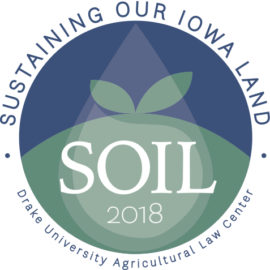SOIL 2019: Searching for Solutions for Iowa’s Land and Water
Monday – November 4, 2019
Olmsted Center, Drake University
On November 4th, the Drake University Agricultural Law Center, in cooperation with other conservation organizations, hosted the latest in the series of SOIL – “Sustaining Our Iowa Land” – conferences. The focus of SOIL 2019 was searching for creative solutions and new ideas to protect Iowa’s water and land. Prof. Neil Hamilton, emeritus director of the Center and conference organizer describes it in these terms: “Most Iowans recognize current efforts to protect land and water are falling far short of what is needed. Our water quality program – the Nutrient Reduction Strategy – is built on a serious flaw: no citizen is asked to accept any obligation to protect surface water. History shows this ‘voluntary’ approach will never be effective in protecting our water. The federal Clean Water Act treats most farm pollution as exempt from legal obligations. Our conservation programs reflect ideas from the 1980’s and do little to address water quality and soil health – let alone climate change. It is time for some new thinking.”
SOIL 2019 was premised on giving the Iowans who are helping search for creative for solutions and new approaches to protect our soil and water the opportunity to explain their ideas. Attendees had the opportunity to hear from many of Iowa’s leading conservationists – people leading the efforts and research behind the new approaches we need to explore.
Brief descriptions and any available materials are provided in links below.
Topics and Speakers:
Chris Jones and Larry Weber, from University of Iowa’s famous hydrology program will lead a session – “Do We Need 5 R’s?” describing how the information and experiences they have gained in monitoring Iowa’s water quality and developing the watershed management approach can be used to scale up improvement efforts. They will ask important questions, such as: can scaling up efforts to protect water quality be accomplished without regulation? Does it make sense to give farmers license to apply however much fertilizer they feel they need, and then ask the public to indemnify their activities and pay for practices to trap pollution at the field’s edge? What would workable and enforceable regulations look like? They will be joined by Susan Judkins, president of the Watershed Management Authorities of Iowa.
Dr. Jerry Hatfield of the USDA National Laboratory for Agriculture and the Environment will lead a discussion entitled “Soils: We Can Do Better” and describe how his research on the impact of climate variation and current crop production practices on soil health can be the basis for designing a new generation of federal soil conservation programs focused on issues facing today’s agriculture. He will be joined by southwest Iowa farmer and cover crop leader Ray Gaesser and by Katie Rock, Polk County Soil and Water Conservation commissioner, who will discuss how soil health concerns can be better reflected in our water quality policy.
Matt Russell, executive director of Iowa Interfaith Power and Light will lead a discussion on the “Values of Farmer Led Climate Action: the moral call to stewardship AND real money!” His work is helping identify the opportunities and challenges created by our changing climate – and how farmers have the opportunity to be in the driver’s seat in sequestering carbon and using farms to fight climate change. He will be joined by his farming neighbor, Justin Jordan, and Mollie Aronowitz, from People’s Company, who will illustrate how this is possible.
The luncheon panel will include several Iowa legislative leaders, including Rep. Chris Hall and Rep. John Wills, to discuss the possible spending formula if the 3/8 cent sales tax increase – known as IWILL – is enacted by the 2020 General Assembly. They will be joined by Ray Gaesser and Joe McGovern, who will moderate.
Dr. Peter Levi of Drake University and Patricia Boddy from the Great Outdoors Foundation will discuss patterns in stream and river health around the Des Moines metro and how the Central Iowa Water Trails will address this important issue, using the $117 million project as a catalyst to spur local and statewide improvements in water quality. They will be joined by Ted Corrigan, interim director of the Des Moines Water Works.
John Norwood, Polk County Soil and Water Conservation District commissioner, will discuss ideas for a green infrastructure fund, and a three-pronged approach to use soil health and water quality needs to drive new forms of rural economic regeneration and agricultural reinvestment. This “land ethic” based approach – focused on: Green Infrastructure; Targeted and Coordinated Soil Conservation; and Farm Output Diversification – could help identify priorities for Iowa’s 100 SWCDs, 3,000 drainage districts and our many Watershed Management Areas. He will be joined by Robert Brownell, from the Polk County Board of Supervisors and by Rich Leopold, director Polk County Conservation Board, meaning all three Polk County governmental units working on resource conservation will be at the table. Norwood Presentation
Joe McGovern and Anna Gray from the Iowa Natural Heritage Foundation will describe how the INHF’s extensive work with conservation easements can serve as a basis for developing a “middle ground” of land ownership and management – one combining private land ownership and protection of important public attributes like water quality, recreation, and productivity. They will be joined by Seth Watkins from Pinhook Farm who will describe his experience using conservation easements to help promote regenerative agriculture on his Southwest Iowa grazing operation.
Prof. Neil Hamilton of the Ag Law Center, ended the day with a discussion of his “Missing Links” project to develop a real strategy for implementing the Nutrient Reduction Strategy, one addressing the politics of water quality, not just the science. This closing session will serve as an open forum for attendees to discuss their ideas for how Iowa can develop more effective and ambitious efforts to improve water quality and protect our soils. Each panel will present creative ideas to illustrate how new approaches and “new thinking” can help protect our land and water. The goal is to help lift Iowa toward an era of clean water, healthy lands and more profitable and sustainable farms. Presentation
A copy of the full agenda is available here.



